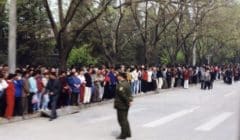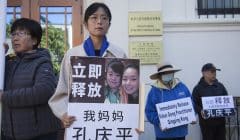Judge of Jiangxi Province High Court, Falun Gong Practitioner: Dead in Custody
Brought Back from the Brink of Death by Falun Gong, Relapse Occurred When Sentenced to Prison and Denied the Practice
NEW YORK, November 8, 2001 (Falun Dafa Information Center) – Sources from Jiangxi Province, China, confirm that Falun Gong practitioner Mr. Hu Qingyun, the former department head of the Jiangxi Province High Court, died in the custody of Chinese authorities earlier this year.
The “6-10 Office,” responsible for persecuting Falun Gong, has strictly controlled all information relevant to this case, rendering an investigation into Mr. Hu Qingyun’s death nearly impossible, sources say.
According to Hu’s relatives, Hu had once recovered from leukemia through practicing Falun Gong. However, the disease relapsed when he was sentenced to prison and was not allowed to practice Falun Gong. Hu died on March 22 in Jiangxi prison hospital.
Hu was diagnosed with leukemia in 1997. After receiving treatment at five major hospitals in Jiangxi and Shanghai, doctors concluded that he would not be able to live for more than three months. In February 1998, doctors from the 1st Attached Hospital of Jiangxi Medical College informed Hu’s relatives that Hu had only 3 days to live and that they should begin funeral preparations. In those last few days, however, Hu Qingyun began the practice of Falun Gong. Two months later, Hu’s relatives say he was alive and well, and his health was continuing to improve rapidly.
When Falun Gong was banned in July 1999, Hu Qingyun wrote letters to state leaders on several occasions describing how Falun Gong had restored health to his fading body. Because of this, he was arrested twice, in July and October, 1999, respectively.
Reliable sources inside China revealed that during the first arrest, Hu Qingyun told policemen that he would die if he were not allowed to practice Falun Gong, as he was a leukemia patient. But policemen replied, “We are not afraid of this leukemia threat!” They threw Hu into prison and did not allow him to practice Falun Gong. Sources say that Hu began to bleed from different parts of his body. Fearing he would die in their prison, he was released by the local authorities. Once home and after resuming his Falun Gong practice, sources say Hu recovered again from the disease.
Later Hu Qingyun was detained without any apparent reason in October, 1999. After one year of illegal detention, Hu was sentenced to a seven-year prison term on January 10, 2001, by the No. 1 Regional Court in Nanchang, the capital of Jiangxi province.
Hu’s sentence was covered by Associated Press, Reuters, and Central Agency on February 6th, 2001.
“A seven year prison sentence for someone in Hu’s condition is, even under normal circumstances, equivalent to a death sentence,” noted Falun Dafa Information Center spokesperson Adam Montanaro. “Chinese government sources, however, told the Washington Post on August 5th that the Beijing `6-10 Office’ had issued an order to throw all ‘active’ Falun Gong practitioners into labor camps and prisons, and to hold them as long as they refused to give up their spiritual beliefs, even if it meant holding them for the rest of their lives,” said Mr. Montanaro. “Therefore,” Mr. Montanaro continued, “as is the case with Falun Gong practitioners throughout China, they were going to hold Mr. Hu in prison until he either denounced Falun Gong or died. The Chinese government must assume full responsibility for Hu’s death.”
Documents received from China disclose that Luo Gan, the head of Beijing `6-10 Office,’ went to Jiangxi in January, directing the Public Security Ministry, State Security Ministry and four additional government offices to form a team to persecute Falun Gong. Consequently, Falun Gong practitioners all over Jiangxi province were arrested, and sent to closed-door brainwashing classes. Sources say that during this time, police claimed that all people who once practiced Falun Gong would be arrested; “no one would be left out.” To achieve this goal, they even took relatives into custody in order to apply pressure on arrested practitioners.






